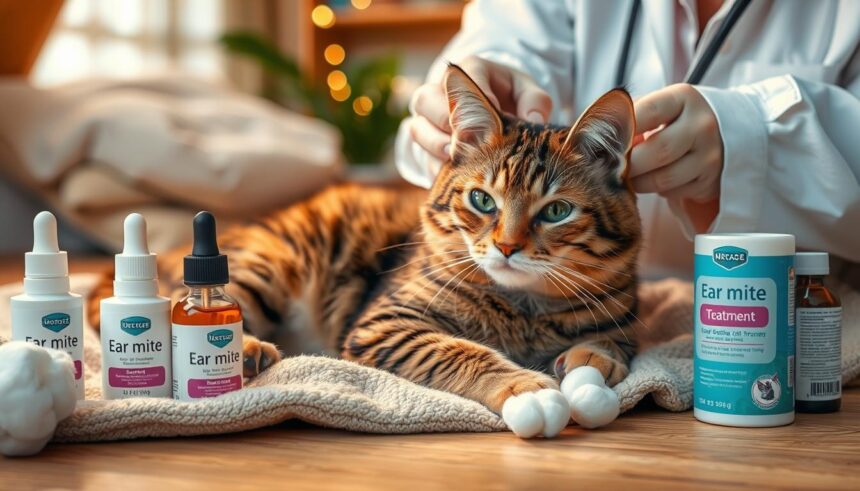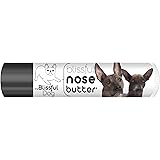Are you curious about ear mites in cats and how to treat them? Ear mites are a common issue in cats. They can cause serious problems if not treated right. About 25% of dog ear infections come from ear mites, and cats can get them too. A study on ear mite treatment for cats found natural remedies can work well.
Ear mites make cats uncomfortable and itchy. They can even lead to serious health problems. There are many treatments for ear mites in cats. The right one can get rid of them in 7-10 days.
Key Takeaways
- Ear mites are a common problem in cats, and effective treatment is crucial to prevent complications.
- Natural remedies can be effective in removing ear mites, with some studies showing a 90% success rate.
- Regular ear inspections are recommended, ideally weekly, to catch potential infestations early.
- Many flea treatments also help prevent ear mites, suggesting a two-for-one treatment could save pet owners time and money.
- Feline ear mite remedies are available, and it’s essential to choose the right treatment to banish ear mites in cats.
- With proper treatment, most ear mite infestations can clear up in 7-10 days, and ear mite treatment for cats can help prevent future infestations.
- Regular cleaning can help to prevent ear irritation and buildup of debris, and all-natural antibacterial ingredients in ear cleaners promote long-lasting benefits.
Understanding Ear Mites in Cats
Ear mites are tiny parasites that feed on the wax and oils in a cat’s ear canal. They cause irritation and discomfort. To find the best ear mite medication for cats, it’s key to know about these parasites and their impact on feline health. Ear mites are contagious and can spread from one pet to another, so treating all pets in the house is important.
When looking at how to treat ear mites in cats, it’s crucial to spot the symptoms. These include excessive scratching, redness, and discharge in the ears. If not treated, ear mites can lead to serious health problems like ear infections and hearing loss. Treatment for ear mites usually takes at least three weeks to ensure they are fully gone.
What Are Ear Mites?
Ear mites, also known as Otodectes cynotis, are tiny, eight-legged parasites that infest a cat’s ears. They hatch in about 4 days and reach adulthood in around 3 weeks. Ear mites are common in cats and can cause inflammation and severe itching in one or both ears.
Symptoms of Ear Mite Infestation
Symptoms of ear mite infestation include:
- Excessive scratching
- Redness and discharge in the ears
- Inflammation of the outer ear and external ear canal
- Severe itching
How Ear Mites Affect Cats
Ear mites can cause a lot of discomfort and health problems in cats if not treated. In severe cases, they can lead to inflammation and even torn eardrums. Treatment with medication can clear up symptoms and get rid of the mites when used for the right amount of time.
Working with a vet is key to finding the best ear mite medication for cats and creating a treatment plan. By understanding ear mites and their effects, cat owners can take steps to prevent infestations. This ensures their pets stay healthy and happy.
| Ear Mite Infestation | Symptoms | Treatment |
|---|---|---|
| Ear mites in cats | Excessive scratching, redness, and discharge | Medication, ear cleaning, and follow-up care |
| Contagiousness | Highly contagious among pets | Treat all pets in the household |
Common Causes of Ear Mite Infestations
Ear mite infestations can happen for many reasons. These include environmental factors and not cleaning ears often enough. Cats that go outside or meet other pets are more at risk. Regular ear cleaning and checks can stop ear mites. Knowing why ear mites happen is key to treating them.
Some common reasons for ear mite infestations include:
- Environmental factors, such as exposure to other infested animals
- Interaction with other pets, especially in crowded areas
- Lack of regular ear care, including cleaning and inspection
Using natural remedies for ear mites in cats can help. But, always talk to a vet before starting any treatment. They can suggest the best option for your cat. You can also visit catsjoys.com for more on ear mite treatments.
Keeping ears clean and getting vet check-ups is key to avoiding ear mites. By knowing why they happen and using the right treatments, you can keep your cat’s ears healthy. This prevents bigger problems.
| Cause of Infestation | Description |
|---|---|
| Environmental Factors | Exposure to other infested animals |
| Interaction with Other Pets | Close contact with other pets, especially in crowded areas |
| Lack of Regular Ear Care | Infrequent ear cleaning and inspection |
Diagnosing Ear Mite Infestations
Diagnosing ear mite infestations in cats needs a detailed vet check. Symptoms can look like other ear issues. Vets use tools like otoscopy and ear swabs to spot ear mites. Early detection is key to avoid problems and treat effectively.
Effective treatments include topical drops like milbemycin and ivermectin. Also, flea, tick, and heartworm preventatives like Revolution® and Advantage Multi™ work well. Cats can get better with one treatment if owners follow vet advice.
Vets use several methods to find ear mite infestations:
- Otoscopy: a visual check of the ear canal with an otoscope
- Ear swabs: taking a sample of ear debris to check for mites or infections
- Ear cytology: looking at the sample under a microscope to confirm mites
By using the right treatments and consulting with a vet, cat owners can help their pets get better. They can also stop future ear mite problems.
| Treatment | Effectiveness | Duration |
|---|---|---|
| Topical drops | High | Single course |
| Flea, tick, and heartworm preventatives | High | Single course |
Effective Home Treatments for Ear Mites
Ear mites are a common problem in cats. There are several home treatments to help get rid of them. When treating ear mite treatment for cats, it’s important to choose a safe and effective method. One popular option is using feline ear mite remedies like ear drops or ointments.
Natural remedies like tea tree oil and aloe vera can also treat ear mites. But, it’s important to talk to a vet before using any treatment. This ensures it’s safe for your cat. Cleaning your cat’s ears safely is also key to prevent irritation and infection. Use a cotton ball and gentle ear cleaner to remove dirt and debris.
To prevent reinfestation, clean your cat’s environment regularly. Use a vacuum to remove mites and their eggs from carpets and upholstery. Regular ear inspections can also help catch infestations early, reducing complications.
Remember, ear mites can spread, so it’s crucial to prevent infection. By using effective home treatments and preventive measures, you can keep your cat’s ears healthy and free from ear mites.
Prescription Medications for Ear Mites
When treating ear mites in cats, sometimes prescription meds are needed. This is especially true for severe cases or when infections happen. The best ear mite medication for cats depends on how bad the infestation is and the cat’s health.
To treat ear mites in cats well, knowing the prescription options is key. Topical treatments like ear drops and ointments can kill mites and reduce swelling.
Commonly Used Topical Treatments
Topical treatments include Davis EarMed Mite Lotion, Miracle Care R-7 Ear Mite Treatment Kit, and Durvet No Bite Ear Mite & Tick Control. These can be applied directly to the ear, offering quick relief.
Oral Medications: When Are They Necessary?
Oral meds like antibiotics and anti-inflammatory drugs might be needed for secondary infections. It’s crucial to follow the vet’s instructions when giving oral meds to get the best results.
Knowing about different prescription meds and following vet advice helps cat owners how to treat ear mites in cats. This ensures their pets get the best care possible.
Importance of Follow-Up Care
After treating ear mites in cats, it’s key to see a vet again. This check ensures the treatment worked and stops more mites. Effective cat ear mite treatments need watching to make sure all mites are gone. The vet will check how the cat is doing and change the treatment if needed.
When you follow up on ear mite treatment, remember a few things:
- Watch for symptoms to make sure they’re gone
- Look for signs of new mites, like swelling or discharge
- Change the treatment plan if needed to avoid more problems
Natural remedies for ear mites in cats might seem good, but they’re not always enough. A vet can tell you the best way to treat and prevent mites. Regular vet visits and ear cleanings are important to keep cats safe from mites.
Preventive Measures for Ear Mites
Stopping ear mite infestations is key to keeping your cat healthy. Regular ear checks and a clean home are vital. For top products for cat ear mite, talk to your vet for the best options.
Regular Ear Inspections
Checking your cat’s ears often can catch ear mites early. Recommended ear mite treatments for cats mix topical and oral meds. Always get advice from your vet on the right treatment.
Maintaining a Clean Environment
Keeping your cat’s space clean is crucial. Clean their bedding, toys, and living area often. These steps help prevent ear mites and keep your cat healthy.
Avoiding Close Contact with Infested Animals
Stay away from animals with ear mites to stop the spread. If you have many cats, keep them apart if one has mites. This helps keep all your cats healthy.
Myths About Ear Mites
Ear mites are common in cats, and many myths surround their treatment and prevention. One myth is that ear mites are super contagious. But, they’re not as contagious as other diseases.
It’s key to know the truth about ear mite treatment for cats. Some think home remedies work, but they often don’t. Instead, feline ear mite remedies made for ear mites can really help.
Here are some common myths about ear mites:
- Ear mites are highly contagious among cats.
- Home remedies are effective in treating ear mites.
- Ear mites only affect outdoor cats.
Seeing a vet is crucial to find the best treatment for your cat’s ear mites. The right ear mite treatment for cats and a good plan can help your cat get better and stay healthy.
Regular ear checks and cleaning can also stop ear mite problems. Knowing the truth about ear mites helps keep your cat’s ears healthy and happy.
| Myth | Fact |
|---|---|
| Ear mites are highly contagious among cats. | Ear mites can be spread through contact with an infested animal, but they are not typically contagious in the same way as other diseases. |
| Home remedies are effective in treating ear mites. | Home remedies can sometimes cause more harm than good, and it’s essential to consult with a veterinarian to determine the best course of treatment. |
The Role of Nutrition in Ear Health
Nutrition is key to keeping your cat’s ears healthy and preventing ear mites. A balanced diet with omega-3 fatty acids and vitamin E supports ear health. Remember, a healthy diet is the base of your cat’s overall wellness.
Some important nutrients for ear health include:
- Omega-3 fatty acids: These anti-inflammatory fatty acids help reduce inflammation and aid in healing.
- Vitamin E: This antioxidant vitamin protects the ears from damage by free radicals.
There are many ways to treat ear mites in cats, like topical treatments and oral meds. Always talk to a vet to find the best treatment for your cat. A healthy diet and proper treatment keep your cat’s ears free from mites.
Feed your cat a balanced diet and prevent ear mite infestations to keep their ears healthy. Always get advice from a vet on the best ear mite medication and treatment for your cat.
| Nutrient | Benefits for Ear Health |
|---|---|
| Omega-3 fatty acids | Reduce inflammation and promote healing |
| Vitamin E | Protect the ears from damage caused by free radicals |
Recognizing When to Seek Veterinary Help
Ear mites can be a big problem for cats, causing pain and discomfort. While natural remedies for ear mites in cats can help, knowing when to see a vet is key. If your cat’s symptoms don’t get better or even get worse after trying effective cat ear mite treatments at home, it’s time to visit a vet.
Look out for signs like a lot of scratching, red ears, and discharge. If you see these, it’s important to see a vet right away. Regular vet visits and ear cleanings can help stop ear mites from getting worse.
Signs That Require Immediate Attention
- Excessive scratching or head shaking
- Redness and inflammation in the ears
- Dark, crusty or waxy discharge resembling coffee grounds
Acting fast can help get rid of ear mites faster. By getting vet help when needed, you make sure your cat gets the care they need to feel better.
When Home Treatments Fail
If home remedies don’t work and your cat’s symptoms keep coming back, it’s time to see a vet. They can give your cat the right medicine and advice. With the right treatment, you can help your cat get over ear mites and stop them from coming back.
| Symptom | Description |
|---|---|
| Head shaking | Excessive head shaking can be a sign of ear mites |
| Scratching | Excessive scratching can lead to hair loss and skin irritation |
| Discharge | Dark, crusty or waxy discharge resembling coffee grounds |
The Impact of Stress on Ear Mite Infestations
Stress can weaken a cat’s immune system, making them more likely to get ear mites. Changes in their environment, separation anxiety, and medical issues can cause stress.
To prevent ear mites, reduce your cat’s stress. You can do this by creating a stable home, spending time with them, and using top products for cat ear mite treatment as your vet suggests.
Some recommended ear mite treatments for cats include spot-on treatments and oral medications. Always follow your vet’s treatment plan for the best results.
It’s also key to tackle any stress that might be causing the ear mite problem. A stress-free environment and effective treatments can keep your cat healthy and happy.
| Treatment Option | Description |
|---|---|
| Spot-on treatments | Applied directly to the cat’s skin, these treatments can help eliminate ear mites and reduce stress. |
| Oral medications | Prescribed by a veterinarian, these medications can help treat ear mite infestations and alleviate stress in cats. |
The Importance of Regular Veterinary Visits
Regular vet visits are key to keeping your cat’s ears healthy and preventing mites. A vet can check your cat’s ears, spot problems early, and give advice on how to prevent them. By taking your cat to a veterinary clinic, you make sure they get the care they need to avoid mites.
Ear mites can cause a lot of irritation and serious problems, but vets can treat them. Early detection is crucial to avoid long-term damage. Regular vet visits also help find other health issues that might lead to mites.
Vaccine Schedules and Ear Health
Vaccines are important for ear health. Following the vaccine schedule helps prevent mites and other health problems. Regular ear cleaning and checks also help spot issues early.
Overall Health Checkups
Regular health checkups are vital for your cat’s well-being. These visits help find health problems, including mites, and offer advice on prevention. Key parts of these checkups include:
- Monitoring ear health
- Inspecting for signs of ear mites, such as head shaking and ear debris
- Providing guidance on preventive measures, such as regular ear cleaning and ear mite treatment for cats
By making regular vet visits a priority and following the vaccine schedule, you can prevent mites and keep your cat healthy. Always use feline ear mite remedies as your vet advises for the best results.
Emergency Situations: What to Do
In emergency situations, knowing how to care for your cat is crucial. If you think your cat has ear mites, get vet help right away. A vet can prescribe the best ear mite medication for cats and show you how to treat ear mites.
For severe ear issues, like a lot of bleeding or discharge, first aid can help. It’s also key to stay calm. This helps you make smart decisions and care for your cat well.
First Aid for Severe Ear Conditions
- Stop any bleeding by applying gentle pressure with a clean cloth.
- Clean the affected area with a mild soap and lukewarm water.
- Apply a topical antibiotic ointment to prevent infection.
How to Stay Calm During a Crisis
It’s hard to stay calm in a crisis, but it’s vital for your cat’s care. Take deep breaths and focus on the now. Remember, your cat needs your help, and with the right guidance, you can get through this together.
| Symptom | Description |
|---|---|
| Head shaking | Excessive head shaking can be a sign of ear mites. |
| Scratching at ears | Scratching at the ears can be a sign of discomfort or irritation. |
| Dark, crusty or waxy discharge | This type of discharge can be a sign of ear mites or infection. |
By following these steps and staying calm, you can help your cat get the best care in emergencies. Always talk to a vet for advice on how to treat ear mites in cats and the best ear mite medication for cats.
Frequently Asked Questions About Ear Mites
Ear mites are a common problem in cats. Many pet owners have questions about these parasites. We will answer some of the most frequently asked questions about ear mites, including their contagiousness and preventability.
How Contagious Are Ear Mites?
Ear mites are not highly contagious. But they can spread through contact with an infested animal. According to ear mite experts, all household pets must be treated to prevent reinfection. The most common sign of ear mite infestation is excessive scratching and/or head shaking.
Can You Prevent Ear Mites Completely?
While it’s not possible to prevent ear mites completely, there are ways to reduce the risk. Regular ear inspections, maintaining a clean environment, and avoiding close contact with infested animals are key. Natural remedies for ear mites in cats can also help prevent infestations. Here are some tips to prevent ear mites:
- Regular ear cleaning
- Using effective cat ear mite treatments
- Avoiding close contact with infested animals
By following these tips and using effective cat ear mite treatments, you can reduce the risk of ear mite infestation. This will help keep your cat’s ears healthy.
| Prevention Method | Description |
|---|---|
| Regular Ear Cleaning | Regular ear cleaning can help prevent ear mite infestations |
| Using Effective Treatments | Using effective cat ear mite treatments can help eliminate ear mites |
| Avoiding Close Contact | Avoiding close contact with infested animals can help prevent the spread of ear mites |
Conclusion: Keeping Your Cat’s Ears Healthy
Keeping your cat’s ears healthy is key to their overall well-being. Ear mites are common, but you can treat and prevent them. There are many ways to keep your cat’s ears in great shape.
Recap of Treatment Options
Effective treatments for ear mites in cats include natural remedies and medications. You can also clean your cat’s ears regularly. This helps prevent and manage ear problems.
Final Tips for Pet Owners
Watch for signs of infection or mites in your cat’s ears. Act fast if you see any problems. Keeping their environment clean and avoiding contact with sick animals helps a lot.
Regular vet visits are also important. By following these tips and using the right treatments, your cat can have healthy ears for a long time.































































